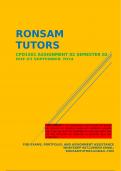RONSAM
TUTORS
CPD1501 ASSIGNMENT 02 SEMESTER 02
DUE 03 SEPTEMBER 2024
DISCLAIMER!!!: The assignments sold through this website
are intended for research, study, and reference purposes
only. They are not to be submitted as your own work. Only
use this document as reference to generate your own
assignment
FOR EXAMS, PORTFOLIO, AND ASSIGNMENT ASSISTANCE
WHATSAPP 0671189059 EMAIL:
RONSAMTUTORS@GMAIL.COM
, QUESTION 1
In any democratic country, citizens employ several checks and balances on public
officials to make them responsible, more accountable, and legal and ethical
compliance. In South Africa, these mechanisms are based on constitution, laws, and
various other checks and balances which allow the public to check on the activities
of the government. The concept of accountability in a democratic society can thus be
best described as the duty of the public office holders and officials to explain and
respond to their actions, decisions, and performance within a given society. The
means for such accountability include legislation, politics, civil society, and the
judiciary.
Public participation in governance through public hearings, comments on draft
legislation, and community monitoring improves accountability. Electoral
accountability empowers people to demand changes within their governance since
officials who perform poorly in their duties or who are involved in fraudulent activities
can be voted out of their positions by citizens. This mechanism ensures that public
officials remain responsive to the needs and expectations of the electorate. 1
One of the most fundamental mechanisms for holding public officials accountable is
through regular, free, and fair elections. In South Africa, general elections are held
every five years, allowing citizens to choose their representatives at the national,
provincial, and local levels. This electoral process is foundational to representative
democracy, as it empowers citizens to remove officials who fail to meet their
expectations and to elect those, they believe will best serve their interests. Without
massive voter participation, this fundamental mechanism would be ineffective. 2
Judicial review is a powerful tool that enables citizens to hold public officials
accountable for unlawful or unconstitutional actions. The Constitution confers on
courts the power to review administrative actions, on grounds that they have been
lawful, reasonable, and procedurally What this means is that the administrative
decisions could be subjected to judicial review to determine if they complied with the
1
Currie, I., & De Waal, J. (2016). The Bill of Rights Handbook. 6th ed. Juta.
2
Currie, I., & De Waal, J. (2016). The Bill of Rights Handbook. 6th ed. Juta.




